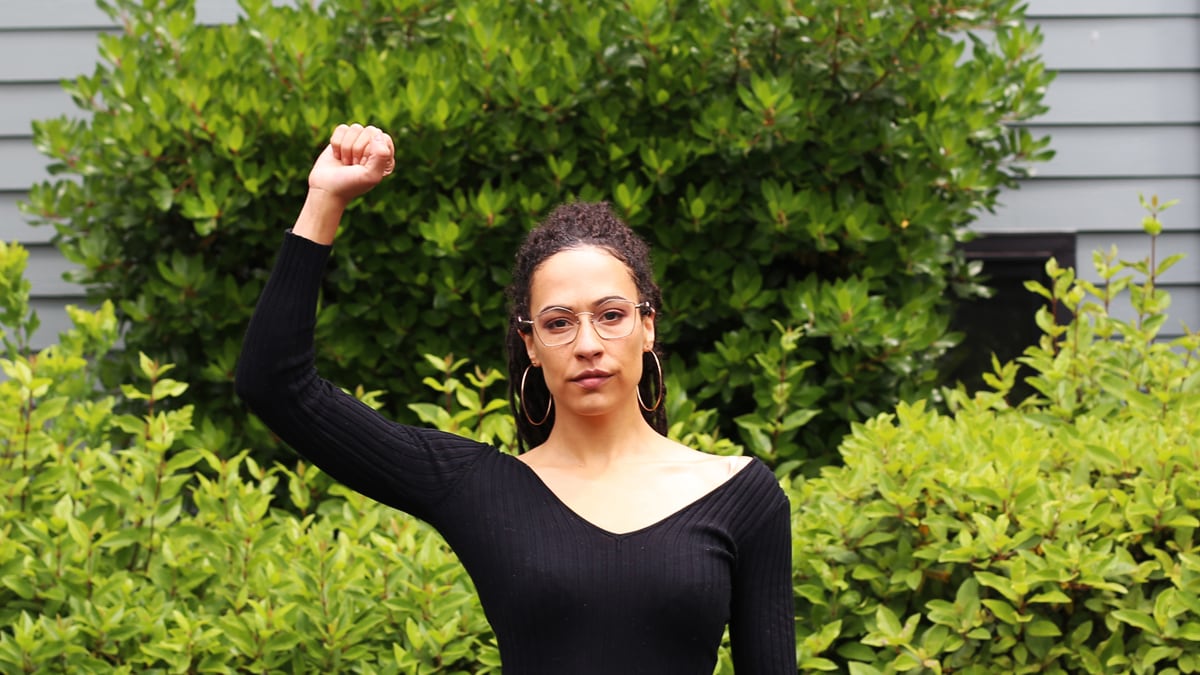On June 19, a group of workers plans to picket outside an unlikely location: Union Jacks strip club.
It's the only club out of nearly 30 Portland establishments that won't agree to demands to ensure fair treatment of black dancers.
"Who's gonna cross a strike line of angry-ass strippers?" says Cat Hollis, a dancer who organized the Portland Stripper Strike.
The picket line is a signal that the national movement for racial justice has extended to the quintessentially Portland institution of strip clubs.
More than 100 dancers have issued the following demands to club owners: require cultural sensitivity training on a regular basis for all club staff, owners and management; ensure that black dancers get fair hiring opportunities and desirable shifts; and require owners and managers to participate in listening sessions with black dancers to learn about their experiences working at Portland clubs.
Hollis says the number of dancers with black or brown skin rarely match the demographics in Portland—where people of color make up 23% of the population.
"I don't know that I've ever really seen a club with those [demographic] statistics—and this is key—on a Friday night or Saturday night," Hollis says.
Hollis, who is black, says managers at some clubs simply refuse to hire dancers of color. Black dancers—if they're lucky enough to be hired at all—are often given shifts in the middle of a weekday during clubs' slowest hours, she says.
"Even before auditioning, you need to ask around if that's a place that hires black people," says Brianna Cistrunk, who is black and has worked as a dancer in Portland since 2015. "Almost every single one of the clubs in Portland does not audition black dancers. And even if we do get an audition, we're given the runaround."
Cistrunk says that while most clubs allow all dancers to audition, many in Portland—especially high-end clubs—hire mostly white or light-skinned dancers with a "Barbie aesthetic."
"But there are no black people," she says. "When you look at me, you know I'm black. I can't pass as, 'Oh, what is she? She looks exotic.' I can't do that."
One of the few Portland strip clubs that catered to a black clientele, Exotica International Club for Men in Northeast Portland, shut its doors in 2015. Its owner, Donna Thames, alleged in a Multnomah County lawsuit in 2016 that the closure resulted from racist enforcement of liquor laws. (City officials required the club to close at midnight for three months after a shooting in the parking lot.) Judge Shelley Russell dismissed the case in August 2018.
The idea of a Portland Stripper Strike started in February, Hollis says, after a male black dancer in Portland died by suicide. But the movement gained new momentum in the weeks following the killing of George Floyd in May, which set off nationwide protests against police brutality and shined a renewed spotlight on racism both across the country and in Portland.
It is perhaps a sign of the political moment that nearly 30 strip clubs in Portland have agreed to the strike's terms in the past two weeks. The dancers set a deadline of Friday, June 19—the day most clubs hope to reopen from COVID-19 shutdowns.
"The reason this has never worked before is that we never all came back [to work] at the same time," Hollis says. "Because technically none of us have jobs right now, it made it a lot easier to risk it for the biscuit."
One club has refused to comply with the demands: Union Jacks on East Burnside Street.
Cistrunk, who worked for a year at Union Jacks, says the club normally had about 40 dancers per shift. She was one of three who were black.
"That was their quota. They would let [black] people audition, but they wouldn't hire them. Because they don't want to attract the 'wrong crowd,'" Cistrunk says.
The club's manager, Ilya Adamidov, did not directly respond to the allegation he hires few black dancers. He told WW he doesn't support the collective's demands.
"She doesn't get to run private businesses," says Adamidov. Asked for clarification on which woman he was referring to, Adamidov laughed and said, "They can fuck off." He then hung up the phone.
The Adamidov family has owned Union Jacks since 1997. In 2003, federal prosecutors charged Ilya Adamidov, now 61, for allegedly bribing a government official. A judge in 2005 convicted him of conspiracy and bribery, and he was sentenced to probation.
Shon Boulden who owns Devils Point and Lucky Devil, which gained national fame for starting a food delivery service during the pandemic, acknowledges that he features few black dancers—but says that's a reflection of the city, and something he's willing to help change.
"It's not just us," Boulden says. "It's several clubs in Portland. If you start looking at every club in town, you're going to see a very low population of women of color. But I think it's time to actively change that."
Cistrunk remains skeptical about clubs actually following through with their commitments on social media to meet the demands of the Portland Stripper Strike—such as implementing racial equity training and improving hiring practices.
"One thing I've learned in the last few weeks is performative allyship. It's kind of hard to be on the wrong side right now," Cistrunk says. "They might feel like they need to be cooperating."
